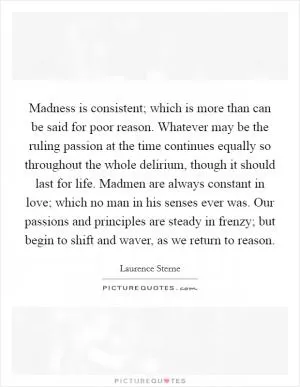Whatever stress some may lay upon it, a death bed repentance is but a weak and slender plank to trust our all on

Whatever stress some may lay upon it, a death bed repentance is but a weak and slender plank to trust our all on
Laurence Sterne, the renowned author of the 18th century novel "Tristram Shandy," was known for his wit, humor, and keen observations on human nature. In his works, Sterne often explored themes of morality, religion, and the complexities of human behavior. One of the recurring themes in Sterne's writing is the idea of repentance and redemption, particularly in the face of death.In the quote, "Whatever stress some may lay upon it, a death bed repentance is but a weak and slender plank to trust our all on," Sterne is cautioning against the idea of relying solely on a last-minute repentance to secure salvation. He suggests that true repentance and redemption require more than a mere gesture made in the final moments of life. Sterne's words serve as a reminder that genuine change and transformation of the soul cannot be achieved through a single act, but rather through a lifetime of reflection, growth, and moral development.
Sterne's skepticism towards death bed repentance can be seen as a reflection of his broader views on human nature and the complexities of moral behavior. Throughout his works, Sterne often portrayed characters who grapple with questions of morality, conscience, and the nature of good and evil. He recognized the inherent flaws and contradictions within human beings, and the challenges of living a virtuous life in a world filled with temptation and sin.












 Friendship Quotes
Friendship Quotes Love Quotes
Love Quotes Life Quotes
Life Quotes Funny Quotes
Funny Quotes Motivational Quotes
Motivational Quotes Inspirational Quotes
Inspirational Quotes